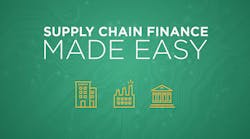3 Ways Manufacturers are Using Supply Chain Finance to Fund the Future
As demands for advanced technologies and innovative transformation increase, manufacturing leaders face a critical obstacle – liquidity. The need for cash is forcing manufacturers and suppliers to make immense and costly changes to their businesses.
In a study published by Deloitte, 86 of the top 100 R&D spenders belong to the manufacturing sector. We can expect more R&D investments in 2019 as the industry looks to overcome challenges such as a shortage of talent and the requirement for “smarter” manufacturing.
According to Korn Ferry, the global manufacturing industry is expected to reach a shortage of nearly 8 million people by 2030. Meanwhile, PwC reports that just 10% of global manufacturing companies are “Digital Champions”, a term PwC uses to describe companies that have a progressive and strategic digital ecosystem connecting customer solutions, operations, technology and people.
PwC also states that nearly two-thirds of manufacturing companies have either not yet started or have just begun the journey to digitalization. But, with 72% of surveyed manufacturers expecting to be ranked as “digitally advanced” by 2020, the upcoming years will focus on accelerating R&D spend to prepare for and embrace the future.
The question that weighs heavily on even the largest, most profitable manufacturers is “How will we fund our strategic business initiatives?” This is especially true for companies that lack access to investment-grade funding. For many businesses across the manufacturing supply chain, the answer should be supply chain finance.
Supply chain finance (SCF) improves cash flow by allowing buyers to optimize their cash conversion cycle by focusing strategically on payment terms with their suppliers. At the same time, suppliers can get paid early by a third-party – typically a financial institution. By extending the invoice due date, buyers free up cash that would otherwise be trapped in the supply chain. Likewise, suppliers can accelerate their own cash flow through access to early payment.
Unlike commercial lending, dynamic discounting or supplier early payment programs, SCF is advantageous for all involved. It doesn’t negatively impact balance sheets, suppliers’ invoices are paid in full, and it delivers material cash flow gains to fund large-scale strategic business initiatives that often require material investments.
Fueling Tomorrow’s Success
From agricultural and automotive equipment to medical devices and household appliances, more manufacturers are turning to supply chain finance to fund transformations to power their future.
Funding M&A strategies. The race to innovate is driving M&A activity across many manufacturing sectors. Global transaction volumes are at all-time highs, with industrial manufacturing M&A activity expected to increase, according to recent reports from PwC. The trajectory shows no sign of change as companies reconcile their growth and innovation strategies with the desire to acquire rather than build out new products and capabilities. For a growing number of manufacturers, supply chain finance is instrumental in funding these transactions in whole or in part.
As part of its long-term growth strategy, Boston Scientific invests heavily in strategic acquisitions – many of which are all cash deals. To improve its cash position, the company implemented an SCF program, which has unlocked nearly $100M in working capital. This has helped the company expand its product portfolio through tuck-in acquisitions, including a developer of atrial fibrillation technologies, for over $300 million (including $175M upfront).
Invest in training to overcome the labor shortage. In a recent survey, the National Association of Manufacturers reported that 64 percent of respondents cited attracting and retaining a quality workforce as one of their top challenges. In response, many manufacturers are taking matters into their own hands.
Michelin North America has partnered with local technical colleges to offer the Michelin Technical Scholars Program, which provides select students hands-on work experience with competitive pay while earning their degree in Mechatronics Engineering Technology. These programs require substantial funding that, in the absence of alternative liquidity options, could negatively impact profits. Control over cash flow is helping businesses like Michelin fund these investments.
Increasing enterprise value. With activist investors on the rise, investors are scrutinizing growth, profitability and especially the ability to generate cash flow. “How can we increase return on capital?” is one question financial executives must answer in the face of higher capital spending. Supply chain finance is one way for them to turn up the dial.
Hillenbrand, a globally diversified industrial manufacturer, experienced a free cash flow decline of 50 percent in 2016 compared to the prior year. Looking to identify an opportunity to improve working capital and enhance shareholder value, Hillenbrand requested a working capital analysis by a supply chain finance provider, which uncovered a $65M working capital opportunity. Hillenbrand immediately decided to implement a pilot program, which achieved 127 percent of its Phase I cash flow goal in the first year by optimizing supplier payment terms. This award-winning SCF program helped Hillenbrand achieve record free cash flow and increase its stock price by nearly 50 percent. Buoyed by these initial results, the company is expanding the program to other operations.
The price of transformation continues to be high for manufacturers, and it’s one reason why industry leaders are embracing supply chain finance. By materially improving cash flow, supply chain finance can unlock large sums of working capital that can be used to fund mission-critical business initiatives.
Tom Roberts is SVP, Global Marketing for PrimeRevenue.



